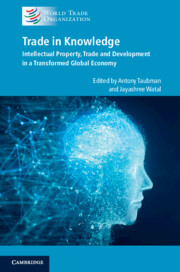Book contents
- Frontmatter
- Contents
- Figures
- Tables
- Contributors
- Preface
- 1 Thematic Overview: Charting the Evolution of Knowledge Flows
- Part I Conceptual Framework
- Part II Measuring Trade in Knowledge
- Part III Impact of Knowledge Flows on Trade and Development
- Part IV Policy, Regulatory and Legislative Frameworks
- Part V Looking Forward
- Index
3 - How Digitization is Transforming Trade
from Part I - Conceptual Framework
Published online by Cambridge University Press: 17 February 2022
- Frontmatter
- Contents
- Figures
- Tables
- Contributors
- Preface
- 1 Thematic Overview: Charting the Evolution of Knowledge Flows
- Part I Conceptual Framework
- Part II Measuring Trade in Knowledge
- Part III Impact of Knowledge Flows on Trade and Development
- Part IV Policy, Regulatory and Legislative Frameworks
- Part V Looking Forward
- Index
Summary
This chapter looks at the ways new digital trends and technologies have stimulated the information component of services trade and consequently enhanced trade in goods and services that embody knowledge. It illustrates the role that ICTs have taken on as conduits for digital and digitally-enabled trade and describes recent digital developments such as cloud services, large scale data analytics, Internet of things, artificial intelligence, robotics, and three-dimensional printing. It presents the relevant trade data and then covers, in broad strokes, the landscape of policy challenges that governments confront as they seek to adapt, and examples of ways trade negotiators have begun to shape new legal frameworks. The rise of such technologies and corresponding growth in services that trade internationally by means of the global movements of information has led policymakers to believe a new or enhanced legal regime could be needed. Not always well understood, digital trends can lead to exaggerated fears and cataclysmic predictions. Over-reaction to these transformations can hold the risk of disproportionate policy responses, which may harm not only trade, but also the sharing of knowledge across borders. One significant challenge, the article nevertheless raises, is that international trade rules are founded on the premise that national governments can implement them at or within their borders. Yet, many of the policy and legal responses that arise from an unanticipated shift in services trade from commercial presence to cross-border supply, have a variety of interjurisdictional consequences. Therefore, whatever trade rules may be employed, existing or new, the article concludes that enhanced efforts at collaboration among governments will be needed to complement and coordinate national initiatives.
- Type
- Chapter
- Information
- Trade in KnowledgeIntellectual Property, Trade and Development in a Transformed Global Economy, pp. 84 - 107Publisher: Cambridge University PressPrint publication year: 2022

